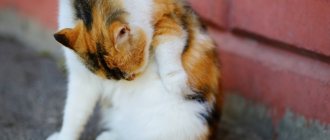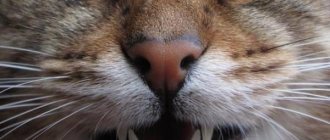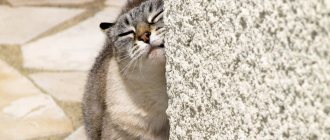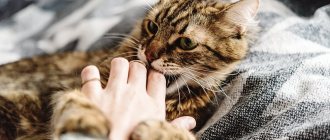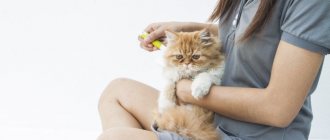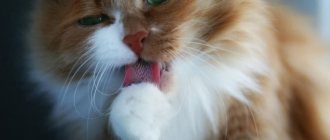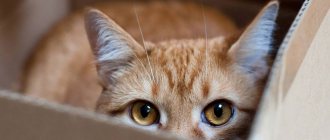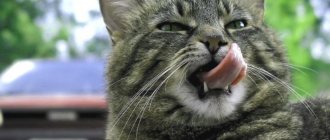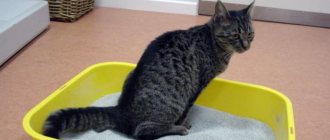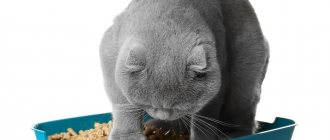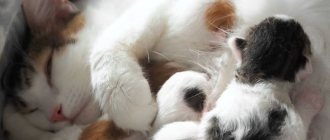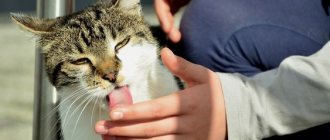Can cats fart: why do cats produce gas?
Veterinarians confirm that cats, like their owners, are not immune to flatulence. This is what doctors call excessive accumulation of gases in the intestines. The strength and frequency of gas discharge is affected by:
- the amount of carbohydrates absorbed by the cat from food;
- organizing a place where the pet eats;
- quality of the selected feed.
Scientists have proven that a cat can fart constantly because of its haste - the desire to quickly empty the plate. At the same time, young individuals suffer from flatulence more often. If kittens eat quickly, you can throw a small ball into a plate of food. This way the pet will have to constantly move its nose, distracting itself from food.
Nutrition and eating habits
Cheap food contains many additives that are harmful to the animal, which negatively affect the functioning of its digestive system.
Fast carbohydrates are well absorbed and do not cause problems.
However, such food should not be more than 15%. It is unacceptable to choose cheap food that contains an abundance of flavorings and dyes. Such artificial components irritate the intestines and stomach, which causes flatulence and other problems with the body. Natural food contains meat, vitamins and ingredients that enhance immunity. It is equally important to provide the kitten with proper access to the bowl. The plate should not be high or very low. Otherwise, the animal will swallow air along with food, which, if repeated regularly, will lead to irreversible disturbances in the cat’s gastrointestinal tract. Foods that cause farts
| Name | Peculiarities | To give or not |
| Fermented milk | Cats fart not from variety or order, but from excess | Up to 3 times a week is possible |
| Soybeans, corn, wheat | Irritates the stomach, triggers the fermentation process | Depends on the initial quantity in the composition |
| Used in feed as a source of protein | ||
| Garlic | Has antihelminthic properties | Forbidden |
| Seriously harmful to the health of the animal | ||
| Fat trimmings | Chicken, beef, fish | Only as a rare supplement |
| bread yeast | Start fermentation processes | Prohibited, especially if the products are spoiled |
| Any food from the table | Rough, unprocessed food, which is dangerous for many purebred animals, such as the Maine Coon |
Physiology or age characteristics
Elderly animals should buy food according to their age to avoid problems with their digestion.
Cats often fart when they are old or young. Young animals simply have an unhardened digestive system, while old pets, on the contrary, may have problems with enzymes that ensure normal breakdown of food. If the stomach is weak, any food is poorly accepted, so veterinarians recommend specialized foods adapted to the age characteristics of the animals.
When is the problem pathological?
In addition to the harmless and easily corrected ones, experts identify dangerous causes of flatulence. These include:
- Individual intolerance or allergy. The disease can arise due to initially incorrectly selected food - too cheap, low-quality, high in gluten, milk sugar.
- Constipation. Often happens due to insufficient fluid, unbalanced nutrition. At the same time, the cat eats a lot, but cannot empty its intestines. This leads to increased gas formation, pain and constipation.
- Congenital anomalies of intestinal development or acquired problems associated with injuries, surgeries and stomach diseases. In these cases, the organ does not perform its functions, food is not digested, and gases with an unpleasant odor are released.
- Dysbacteriosis. With a lack of enzymes for processing food, local immunity decreases, the cat farts constantly, and diarrhea develops. This often occurs after treatment with antibiotics.
- Viruses. The problem is especially common in cats that walk outside. Infection with paraviruses leads to the fact that animals are able to constantly pass gas.
- Inflammation. Flatulence is a sign of the need to urgently consult a doctor. Accompanied by diarrhea, vomiting, bad breath.
This is interesting: Decoding blood tests in cats
Do cats fart?
Increased gas formation occurs as a result of fermentation of food residues in the body. The deviation is caused by the formation of large gas bubbles, difficulties with moving the food bolus, intestinal colic, and an unpleasant odor when cleaning the intestines. Cats fart because the food they eat goes through a complete processing process in the gastrointestinal tract.
Confused cat who got rid of accumulated gases
How to tell if a cat is farting
With flatulence, the animal experiences rumbling sounds in the abdomen; palpation examination shows an increase in the intestinal volume, moderate pain when touched. The pet can sleep peacefully, but when the accumulated gases escape, it suddenly wakes up, jumps on its paws, and meows.
The pathology provokes the development of diarrhea and constant anxiety in the furry pet. If a cat farts, then the problem is related to the inability to fully process the food it eats. Flatulence indicates an incorrect diet or the formation of gastrointestinal diseases.
Good and bad food
The anatomical structure does not provide for increased gas formation due to the short digestive tract. This feature helps the body quickly absorb nutrients and remove metabolic products. Improper care of your pet leads to cats periodically farting.
For your information! According to statistics, young and older animals are susceptible to similar anomalies. Middle-aged cats suffer from flatulence due to the fault of their owners.
Flatulence in cats
Active formation of gases may be associated with air entering the stomach during rapid absorption of food, or with diseases of the digestive tract. The accumulation of fermentation products causes flatulence and belching, causing even a small kitten to fart.
Deformation of the intestinal walls under the influence of gases provokes attacks of vomiting, diarrhea, and cramps. The manifestations are dangerous for pets, but the situation worsens with repeated meals. Stopping the normal processes of processing the food bolus leads to its accumulation in the gastrointestinal tract and rotting. A large amount of unprocessed residues causes general intoxication of the body and a putrid odor.
Do they fart or not?
Owners often have a question: “Can cats fart?” Cats fart, and this is a completely normal process of life. However, this happens very rarely. If your cat farts too often, you should pay attention to your pet's health.
During the digestion of food, gases are formed in the cat's intestines. Gases can also form in the stomach due to the action of carbohydrates. Unlike dogs, cats can form a sufficient amount of carbohydrates themselves. Therefore, their increased content in food can cause increased gas formation in the cat’s stomach.
Reasons why a cat develops gas in the intestines
In fact, there may be several reasons for a cat to start farting. Most of them are harmless, and all cats fart sooner or later, this needs to be taken into account. And, if you hear your pet releasing air from its intestines for the first time, don’t be alarmed. But there are also more serious reasons for concern.
The main symptom is bloating of the abdomen, which becomes very dense and painful to the touch. The animal becomes restless and refuses to eat. At the initial stages, frequent bowel movements and flatulence (the release of foul-smelling food gases) are observed. A more serious stage is characterized by constipation.
Due to the rapid progression of the disease and the severity of complications, you should not self-medicate. At the first symptoms, it is recommended to contact a veterinary clinic. If necessary, as first aid, it is most often recommended to give the pet an anesthetic drug, then administer enterosorbent orally.
With regular manifestations of flatulence, without worsening the general condition, homeopathic medicines and diet therapy with a reduced carbohydrate content can be prescribed.
It should be remembered that this disease may be a secondary symptom of other ailments. For example, dysbiosis or helminthic infestation. That is why it is important not only to eliminate the symptoms, but also to find out the cause that triggered their appearance.
This may seem like an unreasonable question since most people identify flatulence by smell. However, more than 90% of intestinal gases are odorless. Additional symptoms that a cat is suffering from flatulence and digestive problems are the following:
- rumbling in the stomach
- stomach ache
- bloating, abdominal distension
- vomit
- diarrhea
When to contact a veterinarian?
You should contact your veterinarian if your cat exhibits the following symptoms along with strong gas, as they may indicate a more serious problem:
- Pain when touching the cat's belly
- Bloating
- Decreased appetite
- Vomit
- Diarrhea
- Bloody feces
- Excessive drooling
The process of gas formation and accumulation of large gas bubbles in the intestines is called flatulence. A certain amount of gas is produced in a healthy animal; the process of passing gases is natural, and usually it is hardly noticeable. But sometimes, if there is a digestive disorder in a cat, fermentation processes can begin in the intestines, and gas formation occurs at an accelerated rate. This leads to the formation of large gas bubbles, disruption of the movement of food mass, intestinal colic, and loud and foul-smelling discharge of gases.
How do gases form in the intestines of animals, does this happen in cats?
Gas is a byproduct of digestion. They are formed in the intestines of every animal and are the result of the vital activity of bacteria in the intestines. During the digestion of food, microorganisms secrete enzymes that convert the substances absorbed from it into vitamins and other components necessary for the body.
In the process of breaking down food by anaerobic bacteria, a certain amount of gases is formed, which are partially absorbed by them and partially remain in the intestines. If the animal’s body functions without failures, a small amount is absorbed into the bloodstream, while most leaves the body through the rectum.
These substances consist of:
- oxygen;
- nitrogen;
- carbon dioxide;
- hydrogen;
- a small amount of methane.
The components of intestinal gases are odorless. It appears due to substances containing sulfur, which are secreted by bacteria that live in the large intestine. Cats, like any other animal, produce gases in their bodies.
Why does a kitten or an adult animal have increased gas production, and why is this dangerous?
Excessive gas formation is most often observed in kittens and older cats. This problem may be caused by the following in your pet's diet:
- Dairy products. When preparing your pet’s diet, you need to ensure that the animal consumes these foods no more than 2-3 times a week.
- Soybeans, corn and wheat , which irritate the stomach of a four-legged pet and cause fermentation in it. Despite this, such components are used by many feed manufacturers as a source of vegetable protein.
- Garlic and onion. These products have excellent anthelmintic properties, but they can lead to serious problems with the digestive system.
- Tomatoes.
- Cabbages.
- Potatoes.
- Fatty foods. It doesn’t matter what kind of fat it is - chicken, beef or fish, in large quantities it is contraindicated for cats.
- Bakery products. The yeast contained in these products provokes fermentation.
- Spoiled finished food. Many people mistakenly think that animals are able to digest absolutely any food. It's not like that at all. Poor quality food can provoke irritation of the mucous membrane of the digestive tract and even cause intoxication of the body, accompanied by excessive gas formation, diarrhea and uncontrollable vomiting.
There are other causes of flatulence in cats:
- Obesity.
- Aerophagia. Swallowing air is accompanied by the cat's hasty and greedy eating of food. During the rapid absorption of food, a lot of air enters the animal’s body, which accumulates in the digestive canal. Aerophagia in representatives of the cat family can be of a psychogenic nature. For example, some cats that have suffered severe emotional shock eat very quickly, swallowing air. If an animal is stressed, it may swallow air without even eating.
- Blockage of the stomach with hair that gets into it during licking.
- Worm infestation.
- Constipation. Difficulty with spontaneous bowel movement can be caused by various factors, such as blockage of the intestine with bezoars, ingestion of a foreign body, parasitic infection, neoplasms in the intestine, etc.
- Dysbacteriosis , characterized by an insufficient number of beneficial microorganisms in the intestines of an animal.
- Intestinal inflammation of bacterial or viral etiology.
- Tumors in the intestines.
- Intestinal viruses.
- Various gastrointestinal pathologies.
- Cardiovascular diseases.
- Diseases accompanied by impaired nasal breathing.
Despite the seeming harmlessness of this phenomenon, it is extremely dangerous for the health and life of the pet. Excessive gas formation in these animals can provoke:
- chronic bloating, which will lead to exhaustion, because the intestines will not be able to fully absorb food;
- compression of internal organs, causing disruption of local blood circulation in the affected area;
- ruptures of the stomach and intestines;
- failure of the digestive system;
- inflammation of the bladder and other diseases of the urinary system.
This is interesting: How to put a blanket on a cat?
Causes of gas accumulation
Any gas formation is the result of fermentation. Most often, cats fart due to a violation of their diet, when a large amount of carbohydrates enters the body. The cat practically does not need them: in the small intestine, carbohydrates are broken down into glucose, which is necessary only for brain function. Excess carbohydrates cause bloating: excess gas is released either when the cat farts or when he burps. The remains of carbohydrate-rich food accumulate in the abdominal cavity and begin to rot there, which entails pathological changes in the functioning of the entire animal’s body.
The second reason for the accumulation of gases is the presence of intestinal parasites. Helminths live in the small intestine, irritating its walls and causing general allergies in the body. In large concentrations, intestinal parasites can cause blockage of the intestines and bile ducts. If a cat is infected with worms, it will not only fart frequently, but also suffer from constipation.
The third reason is the swallowing of excess air when quickly eating food. In this case, the cat will more often burp than flatulence. It is enough to reduce the portions and increase the frequency of feeding, and the cat will stop spoiling the air.
The fourth reason is diseases of the digestive system. Most often this is dysbacteriosis. In older animals there is a decrease in peristalsis.
This is interesting: How long does a cat walk for the first time?
Changing your diet
Improper feeding is one of the main sources of indigestion and gas in a cat. A lack or excess amount of food, an incorrectly selected diet, and eating waste from the master’s table provoke gastrointestinal dysfunction. Mature pets are in a subgroup at increased risk for the disease, and their weakened bodies require a sufficient supply of vitamins and minerals.
Note! Good expensive food has a high price, but does not harm animals. They are categorized by age, activity level and body weight. They cannot overfeed or underfeed your furry pet.
Why are cheap options not suitable? They have added foreign components - legumes, soybeans, corn. For a carnivorous predator, they are foreign and are poorly digested in the gastrointestinal tract. Artificial flavor enhancers and other flavorings become a favorable source of proliferation of pathogenic microflora.
You cannot buy food according to your pet’s taste preferences. If earlier he avoided foods that were dangerous to health, now manufacturers manage to lull his vigilance with third-party additives. Inexpensive food is made from components that attract attention and interest the animal. The result of saving is a storm in the stomach due to active fermentation.
Manufacturers of branded mixtures indicate on the packaging the constituent ingredients: proteins, a mixture of poultry, beef, rabbit and other animals, vegetable fats. They do not contain soy, corn and other components that increase the weight of the feed.
Does my cat pass gas after feeding? They can be caused by disruption of the feeding schedule. Three meals a day are allowed; the best option is morning breakfast and evening dinner. If an animal has access to food all day, overeating results in flatulence and other unpleasant symptoms.
Important! A hungry pet is not able to patiently wait for the time when a careless owner remembers his responsibilities. He starts looking for food in trash cans, on the table, and tries to escape into the street. This behavior is not the result of curiosity, but a problem that leads to serious illness.
Hungry cats often look in the trash
What foods cause flatulence?
Ready-made animal feeds are balanced in the amount of proteins, fats and carbohydrates. When owners start feeding their pets food from the table, intestinal problems begin. There are foods that should not be overused when feeding a cat.
- Dairy products (milk, cottage cheese, sour cream, kefir) can be given to the cat twice a week. The thing is that the animal’s body is not able to digest lactose. This is one of the reasons why cats fart and get diarrhea. In addition, excessive consumption of dairy products rich in casein and denatured protein often leads to the development of allergies.
- Corn, wheat and soybeans in their pure form cause fermentation in the intestines. They contain starch, which is absorbed by the cat’s body only after processing. In their raw form, such products lead to increased gas formation.
- Fatty foods, especially fat trimmings from meat. The pancreas does not produce enough enzymes to process fatty foods.
- Bakery products due to their high yeast content.
- Fish, as a result of an excess of phosphorus in it, is not suitable for frequent feeding of a cat. Tuna is especially harmful. Fish is acceptable in a cat’s diet twice a week.
- Garlic and onions, which cats love to give as a preventive measure for worms, irritate the walls of the stomach and intestines, disrupting the functioning of the digestive system.
We suggest you familiarize yourself with: Festering eyes in a cat, how to treat common causes
Can cats "fart"?
For some reason, it is believed that a cat’s stomach can digest slightly spoiled foods that are unsuitable for humans to eat. This is not entirely true. Such food can cause irritation of the mucous membrane of the digestive tract, and even cause food poisoning in the animal, accompanied by gas formation, diarrhea and vomiting.
Bakery products
If you treat your pet with a piece of cake from the owners’ table or a bun, most likely the animal will not refuse the treat. But cats are not people; carbohydrate foods and products containing yeast are not good for them. These foods cause fermentation in the intestines of the baleen-striped. Over time, a cat's passion for baked goods can result in intestinal inflammation.
Milk and milk products
Since childhood, we have become accustomed to cartoons and fairy tales in which cats enjoy milk and sour cream, and we believe that this is the best food for furry friends. In nature, not a single animal that has emerged from childhood feeds on milk. Adult animals do not produce enough enzymes to digest these foods. If you actively feed your cat milk, this can lead to lactose intolerance and intestinal inflammation. Cats can digest sour cream and cottage cheese in small quantities, but the amount of these products should be strictly limited. It is better not to give milk to the cat at all. You can pour a saucer of milk for the animal one day, and then treat it for 2 months.
Fish and fish products
Another misconception about cat nutrition is that these animals must eat fish. Cats are carnivores, but their diet should consist of meat. Fish can be present as a delicacy (no more than 2 times a week) in the pet’s menu, but in no case in raw form. More often, fish causes the formation of kidney stones in animals, cats are especially susceptible to this. In cats, the structure of the urinary system is different and stone formation is less common, but fish can cause digestive problems accompanied by flatulence.
Spicy vegetables
Onions, garlic, spices - all this irritates the intestines of a pet and can cause gastritis and colitis. Inflammation of the intestinal mucosa is accompanied by stool disturbances and flatulence.
Some owners mistakenly believe that garlic can be used to fight helminthic infestations in cats. There is such a folk method of getting rid of intestinal parasites in humans. Even for humans, it is controversial, although popular. You should not use it on your pet under any circumstances.
Meat trimmings and fat
If you give a cat connective tissue scraps from meat (fascia, cartilage, fat), most likely he will swallow them. But this is an unequal substitute for meat. If fat predominates in the animal’s diet, this can cause indigestion, liver dysfunction, flatulence, and diarrhea. If fatty foods are the basis of your pet’s diet, over time this will result in chronic diseases of the digestive system.
Cereals
Some cats are very picky about food, while the owners of others boast that their pets are omnivores. Even if the cat complacently eats everything that the owner offers, it is impossible for the diet to be based on wheat, corn or soybeans. These products lead to increased gas formation and disruption of intestinal function.
Treatment of flatulence
It is possible to treat bloating in a cat without involving a veterinarian only if there is simple flatulence in which there is no manifestation of any other disease. In other cases, an immediate visit to a veterinary clinic is necessary. Answering the question of what to do if a cat’s stomach is swollen, we can advise the following:
- Hilak Forte - Give 1 drop per 1 kg of weight once a day, until complete recovery;
- Smecta;
- Enterosgel;
- Children's espumesan.
A bloated belly in a cat is a dangerous condition and its cause must be identified. This is often a symptom of a serious injury. The problem should be resolved with the involvement of a veterinarian. If the cat begins to bloat before our eyes, and there is no urinary retention, it is necessary to give medication for allergies, since this is most likely it. As soon as the attack subsides, the size of the abdomen will return back, and everything will be normal.
Flatulence in cats is an excess of the normal amount of gas in the stomach or intestines. Flatulence is more common in dogs than in cats, but in cats it is usually related to their diet, or when they swallow air while eating, when they eat too much or too quickly, or when the animal has an upset stomach, colon, or small intestine. .
A small amount of gas is natural in cats' digestion and it usually goes away quickly. However, excessive gas or flatulence, especially if it smells bad and is accompanied by other symptoms, may indicate problems in your cat's digestive system.
Owners sometimes don’t even know if a cat is farting, because unlike humans, animals do it very quietly. Flatulence in cats becomes obvious with the appearance of a foul odor.
The first measure is to change the diet, even if the cat eats only special food. You will have to experiment to find out what causes the accumulation of gases in the animal. To prevent your cat from swallowing excess air, it is recommended to soak ready-made dry food first.
If an unpleasant odor appears during the release of gases, the animal should be shown to a veterinarian. If the doctor diagnoses “dysbacteriosis”, then probiotics will be needed, most often Lactoferon. Together with them, you will need to help the body get rid of toxins by giving activated charcoal or Atoxil. Smecta will help eliminate irritation of the intestinal walls, and Espumisan will help reduce gas formation. Kittens can be fed with dill water.
Food allergies and intolerances to certain foods are treated with antihistamines. In severe cases, the cat will be prescribed antibiotics. If gas formation is associated with pathology of internal organs (with intestinal obstruction), surgery is performed.
We suggest you read: Duodenitis in cats causes, diagnosis, treatment
Prevention of flatulence
If you want to prevent the occurrence of flatulence, then you need to adhere to the following recommendations:
- Always watch what you feed your cat. Firstly, try not to overfeed him, and secondly, always check the expiration date of the food you buy.
- To avoid various viral enteritis, we advise you to vaccinate your pet in a timely manner.
- Give your pet anthelmintic medications every 3 months. To protect against worms, also avoid contact with street animals.
Goodies for the night
Features of the stomach
A cat's stomach is single-chamber. The inside is lined with a mucous membrane that produces gastric juice. There are two openings from the stomach: one opens into the esophagus, and the other opens into the small intestine.
The cat's stomach serves to store food and control the rate at which food enters the intestines and secretes enzymes necessary for the digestion process. Mixing and grinding of food occurs in it. With muscle movements, it directs food into the small intestine.
When food enters the stomach, its bottom relaxes to reduce intragastric pressure. The smell and taste of food causes the secretion of gastric juice. Digested food is sent to the intestines, and its undigested part remains in the stomach. The more caloric a food is, the slower it is digested.
What causes increased gas formation?
The following reasons will tell you why a cat farts and why the intestines do not function normally:
- Individual intolerance. Allergies are associated with a negative reaction of the body to certain foods. Most often these are gluten, milk sugar, and artificial ingredients in dry and liquid food. A striking example is budget food. Cheap formulations add elements that cause addiction in the animal, which then farts, suffers from gas and colic.
- Constipation. If a pet cannot empty its intestines or fart, this will inevitably lead to gas formation and other processes that cause discomfort to the cat.
- Limitation of intestinal functions. The pathology of the inability of the intestines to process food is most often a congenital problem. Other factors include injury or previous stomach illnesses. An accurate diagnosis can only be made with long-term observation by a doctor.
- Dysbacteriosis. For normal functioning, the stomach and intestines will need positive microorganisms. Their deficiency leads to decreased immunity and problems with flatulence, when the animal farts constantly. Bacteria are destroyed due to active use of antibiotics or through toxicity.
- Viral infection. If a cat goes outside and does this more than once a day, catching the virus is easier than ever. The most common is parvovirus, found in every second street reveler, for whom farting becomes the norm.
- Inflammatory process. Diarrhea, vomiting, and bad breath will help identify the presence of inflammation. Flatulence in such diseases is a side effect, signaling that it is time for your pet to see a veterinarian.
In addition to diseases, you should also know about the natural reasons why a cat farts a lot.
Firstly, this is an increased amount of carbohydrates in the body. According to regulations, food for adults should not contain more than 15% carbohydrate particles. Moreover, it is better if these are so-called fast carbohydrates, the digestion and processing of which will not cause problems in the intestines and will not lead to farting.
Secondly, we must not forget about the rules for organizing a place to eat for a cat. When the bowl is too low or high, the cat is forced into an awkward position. This leads to air entering the stomach and natural gas formation, farting. If an animal farts and constantly faces such problems, there is a high risk of critical disruption of digestive processes.
Those who skimp on pet food face this problem more often. The cat farts very often, which is a consequence of exposure to artificial ingredients and flavoring additives that negatively affect the stomach, intestines and the body as a whole. Branded formulations are prepared from natural meat and include the entire vitamin complex aimed at strengthening the immune system.
According to doctors' studies, the main reason that a furry animal farts is swallowing air. Diseases and poor quality of feed take second place. But flatulence is always an individual indicator, although in a healthy cat gases pass out within two hours after eating and in most cases unnoticed by others.
A cat may also swallow air due to its own clumsiness. This is a common problem for kittens who want to eat constantly and try to empty the bowl as quickly as possible. Young cats fart more often. A plastic ball will help moderate the ardor. In this case, the kitten will have to select food and move the ball with its nose, which will significantly slow down its eating.
Clinical picture
Of course, when a cat constantly passes gas, the diagnosis is quite simple. But it’s still worth remembering that there are other clinical signs that directly indicate flatulence:
- Vomit.
- Diarrhea or constipation.
- Rumbling in the stomach, also known as borborygmy. Occurs when intestinal gas bubbles begin to “roll” in the intestines.
- Copious release of gases through the anus. Sometimes the smell is so strong that it is impossible to be in the same room with the animal.
- Muscle spasms causing severe pain. It is impossible to touch the stomach of a sick cat, since the animal reacts to such attempts very inadequately and aggressively.
In addition, the stomach of a sick pet noticeably swells and feels like a drum . The muscles become very tense. The cat cannot lie or sit quietly, constantly fidgets, and sometimes howls in pain. A pet in this state refuses food, and thirst may persist.
Causes, symptoms and diagnosis
Having noticed that flatulence constantly bothers your cat, you should not go to extremes, come up with terrible diagnoses, and even less self-medicate. Let’s immediately say that flatulence can occur for hundreds of reasons; we will give the most common ones. So, increased gas production can be associated with a number of ailments or abnormalities in the body’s functioning:
- Constipation - a cat cannot empty its intestines in a timely manner for some reason.
- Allergies or individual intolerances – cats may be intolerant to certain substances, such as milk sugar or gluten. Against the background of immunity, a four-legged animal can happily consume harmful foods, and then suffer from gases.
- The inability of the intestines to properly digest food can be due to a number of reasons, from paresis and insufficient peristalsis to metabolic disorders. Such a problem can only be identified by long-term monitoring of the condition of the cat.
- Dysbacteriosis is a condition caused by an insufficient number of beneficial bacteria in the intestines of an animal. Friendly microorganisms may be destroyed by antibiotic treatment or replaced by other microorganisms.
- Intestinal inflammation is infectious or bacterial - typical signs: diarrhea, vomiting, frequent belching, bad breath.
- Intestinal viruses, such as parvovirus.
- New growths in the intestines, including benign ones.
- Other diseases of the gastrointestinal tract.
In addition to illness, flatulence can be associated with aspects of care. After analyzing the points below, you will understand why a cat farts:
- A diet high in carbohydrates - the cat’s menu should contain fast carbohydrates, but according to generally accepted rules, no more than 13-20% of the total food (for adult cats).
- Incorrect body position while eating food or water - when the bowl is low and uncomfortable and the cat has to take an unnatural position while eating, this leads to swallowing air. A similar situation occurs if the bowl slides on the floor while eating. A small amount of swallowed air is released in the form of belching. If a cat constantly swallows air, this leads to poor digestion and the development of severe flatulence.
The volume of accumulated gases is a very individual indicator. In some cats, flatulence is almost unnoticeable (gases pass for up to 2 hours), while for others it brings noticeable inconvenience: vomiting, diarrhea, severe gurgling in the intestines and, as a result, cramps. It has been established that the main factor in the development of flatulence is swallowing air, followed by swallowing food too quickly.
The problem of swallowing air can be solved relatively easily - purchase a non-slip mat or stand for the bowl. It is more difficult to fight flatulence if it is caused by the fermentation process. If you suspect that the cause of gas accumulation is insufficient quality care, you will find instructions for action in the next section.
If everything is fine with your diet and you are sure of it, you need to go to the clinic and conduct a series of examinations:
- Examination of the cat and palpation of the peritoneum.
- Complete blood test, including kidney and liver parameters.
- Urine and stool analysis.
- Ultrasound and, if necessary, X-ray examination of the abdominal cavity with contrast.
Bloating in a cat due to flatulence
So that you have no doubt that your cat really has flatulence and not some other disease, we suggest that you familiarize yourself with the characteristic symptoms of this disorder. So, the cat behaves restlessly, meows pitifully and tries to attract your attention, or, on the contrary, hides in a dark corner and sits there, showing no signs of life.
Do cats fart?
However, despite the fact that sphinxes are calm about such events in their lives, you should not push them from your place rudely. Carefully move your pet to another place or simply verbally ask to “move.” The Sphinx will definitely listen and lie down next to you, waiting for you to get comfortable.
WHY SPHINXES SLEEP A LOT
Normally, cats sleep up to 16 hours daily, and even in the remaining 8 hours of the day they can fall into a state of light doze for a long time. This is very important for the sphinx, because it is this condition that allows its body to recover and ensure normal functioning of all tissues in general and the nervous system in particular. If your Sphynx doesn't sleep enough, he will quickly become irritable and aggressive and may even get sick.
This phenomenon has not been fully studied, but regardless of whether the cat is sleeping or awake, it continuously receives the information it needs from the outside world. A cat's sleep phases constantly alternate between deep and superficial, which is easy to notice by the twitching of whiskers and paws, the movement of claws and ear movements. No matter what happens around, the Sphinx's brain is equally active, and the animal is constantly on the alert.
WHY ARE SPHINXES AWAKE AT NIGHT?
Another reason why your cat may seem to sleep a lot is because of its special lifestyle. Cats prefer to stay awake at night. This is due to both genetic characteristics and the characteristics of the cats themselves: they have always been nocturnal animals, because it was at this time of day that their hunting instinct woke up.
WHY SPHINXES LOVE HEIGHTS
Sphynxes love to climb onto the refrigerator or the highest cabinet, and this is not surprising - this is another manifestation of the hunter's instinct! It is in the genes of cats that they want to climb trees, and in the absence of such, they climb onto furniture. In this way, the cat manages to control the situation in the house and monitor it from above in order to jump off at the right moment and intervene in what is happening.
If you carefully observe your beloved Sphynx, you will be able to unravel many secrets and cat tricks, and understand the behavior of your pet that seems strange at first glance.
come back
Being predators by nature, this food is not beneficial for cats and leads to various disturbances in the functioning of the digestive system, food allergies, flatulence, bad breath in cats and other symptoms. Flatulence in a cat can be caused by the presence of parasites in the intestines (worms in cats).
Symptoms of flatulence. The cat behaves restlessly, meows pitifully and seeks to attract your attention, or, on the contrary, seeks to hide in a dark corner. During a clinical examination, the veterinarian notes rumbling in the abdomen, the abdominal area is painful on palpation, the abdomen is swollen, stretched and enlarged in volume, the cat is vomiting (vomiting in a cat), diarrhea appears (diarrhea in a cat).
The diagnosis of flatulence is made by a veterinarian based on the clinical picture of the disease and asking the animal owners about the cat’s feeding diet. During your appointment, your veterinarian will give your pet a blood test, stool test, urine test, and an X-ray and ultrasound of the abdomen.
Differential diagnosis. Intestinal flatulence must be differentiated from abdominal dropsy (ascites), peritonitis, coprostasis, intussusception, helminthic infestation, and abdominal tumors.
Treatment. With a one-time and short-term accumulation of gases in the gastrointestinal tract, treatment is usually not required. In the event that the situation with flatulence in a cat becomes critical, and you do not have the opportunity to go to a veterinary clinic and show the cat to a veterinary specialist, you will have to provide first aid yourself.
To relieve spasms of the intestines and stomach, it is recommended to give the cat painkillers (baralgin, traumeel, antipyrine), the dose depends on the weight of the animal and its age. In order to adsorb the gases formed in the intestines, the cat must be given an activated carbon tablet or polysorb diluted in water into the mouth. After a few hours, we give the cat a cleansing enema.
In order to increase the processes of salivation and belching, you can insert a wooden stick greased with ichthyol or table salt into the oral cavity and secure it with a bandage on the back of the animal’s head.
To prevent the development of putrefactive microflora in the intestines, the cat must be given a lactoferon tablet.
For intestinal flatulence, homeopathic remedies such as Nux vomica Homaccord, Engistol, which can be used as injections, as well as by oral administration, have proven themselves well. For internal use, you can use liarsine, giving it several times a day, sometimes every 15 minutes until the symptoms of flatulence disappear.
Prevention of flatulence. Prevention of flatulence should be based on preventing the causes that lead to the development of flatulence in an animal. You need to start with your diet, excluding from it foods that can lead to the development of flatulence. Avoid greedy and plentiful eating of food. It is advisable to feed your cat at the same time every day.
Strives to reduce the content of foods containing large amounts of carbohydrates in the diet. Regular walks with the cat or letting it outside have a good preventive effect in the fight against flatulence. For preventive purposes, it is a good idea to teach your cat to drink dill water, infusion of mint, cumin, and chamomile.
Tags: Cats
A cat may sleep, then suddenly jump up and even meow, with gases escaping loudly. The process of defecation may be disrupted, and diarrhea may begin. The cat becomes restless.
The development of flatulence in cats is evidence that their body cannot fully digest the food they eat. This may indicate errors in the pet’s diet and the development of gastrointestinal diseases.
Cats, due to their anatomy, rarely experience flatulence. They have a short digestive tract, which facilitates the rapid absorption of nutrients and the removal of waste products from the body. However, the domestication of cats has led to the problem occurring more and more frequently. And the responsibility for this lies with the owner, who decides what, when and how their pet will eat. Most often, kittens and older animals suffer from flatulence.
Cats must receive meat, but not fat or chicken (duck) skin.
If gas formation is excessive and causes anxiety for your pet, you can give him enterosorbent in a children's dosage or simethicone preparations (Simethicone, Espumisan). And take him to the clinic for a consultation to rule out serious pathologies of the digestive system.
Treatment is carried out depending on the cause of the pathology. These can be anthelmintics, antibiotics and antimycotics. If intestinal ulcers form, surgery may be indicated. In mild cases, veterinarians prescribe drugs that regulate intestinal microflora and carminative drugs. If necessary, a gas tube can be inserted.
Flatulence is accompanied by impaired digestion of food, this is due to irritation of the intestinal walls or the ingestion of carbohydrate foods into the animal's intestines. Most often, cats suffer from gases whose owners do not feed them properly.
Expired feed and meat products that are “tasty for everyone” often cause flatulence in animals. For some reason, it is believed that a cat’s stomach can digest slightly spoiled foods that are unsuitable for humans to eat. This is not entirely true. Such food can cause irritation of the mucous membrane of the digestive tract, and even cause food poisoning in the animal, accompanied by gas formation, diarrhea and vomiting.
If you treat your pet with a piece of cake from the owners’ table or a bun, most likely the animal will not refuse the treat. But cats are not people; carbohydrate foods and products containing yeast are not good for them. These foods cause fermentation in the intestines of the baleen-striped. Over time, a cat's passion for baked goods can result in intestinal inflammation.
Since childhood, we have become accustomed to cartoons and fairy tales in which cats enjoy milk and sour cream, and we believe that this is the best food for furry friends. In nature, not a single animal that has emerged from childhood feeds on milk. Adult animals do not produce enough enzymes to digest these foods.
If you actively feed your cat milk, this can lead to lactose intolerance and intestinal inflammation. Cats can digest sour cream and cottage cheese in small quantities, but the amount of these products should be strictly limited. It is better not to give milk to the cat at all. You can pour the animal a saucer of milk one day, and then treat it for 2 months.
Another misconception about cat nutrition is that these animals must eat fish. Cats are carnivores, but their diet should predominantly consist of meat. Fish can be present as a delicacy (no more than 2 times a week) in the pet’s menu, but in no case in raw form. More often, fish causes the formation of kidney stones in animals, cats are especially susceptible to this.
Onions, garlic, spices - all this irritates the intestines of a pet and can cause gastritis and colitis. Inflammation of the intestinal mucosa is accompanied by stool disturbances and flatulence.
Some owners mistakenly believe that garlic can be used to fight helminthic infestations in cats. There is such a folk method of getting rid of intestinal parasites in humans. Even for humans, it is controversial, although popular. You should not use it on your pet under any circumstances.
If you give a cat connective tissue scraps from meat (fascia, cartilage, fat), most likely he will swallow them. But this is an unequal substitute for meat.
If you are wondering “do cats fart”, then you are probably interested in the reason for this phenomenon. The reason for the increased formation of gases in the stomach can be a sudden transition of the animal to another food. It is worth remembering that if an animal eats one type of dry food, then abruptly switching it to another can be very harmful to the body. New food should be introduced into the diet gradually so that the body gets used to it.
Another reason may be swallowing air while eating. This is due to the fact that the cat's bowl is too low or high, which is why the animal is forced to take an uncomfortable position while eating. Rapid absorption of food can also lead to swallowing air: this is typical for kittens and young individuals.
The increased content of carbohydrates in food is one of the main reasons for the formation of gases in the stomach. Flatulence is also possible as a result of an allergic reaction to some food component. Very allergenic are cheap foods that contain a large number of various chemical additives that cause addiction in the animal.
Increased gas formation can be caused by inflammatory processes in the stomach and intestines. Congenital pathologies or injuries received during life can disrupt the functioning of the digestive system.
A common cause of flatulence in street animals is viral infection. Another reason for increased gas formation can be dysbacteriosis. A change in the number of microorganisms in the stomach can occur after an animal takes antibiotics or due to inflammatory processes in the body.
You can hear rumbling sounds along the animal's intestines, the intestines are swollen, and sometimes moderately painful. The animal tries to avoid probing the abdomen. A cat may sleep, then suddenly jump up and even meow, with gases escaping loudly. The process of defecation may be disrupted, and diarrhea may begin. The cat becomes restless.
You can hear rumbling sounds along the animal's intestines, the intestines are swollen, and sometimes moderately painful. The animal tries to avoid probing the abdomen.
Most often, increased gas formation is associated with errors in the cat’s diet. You need to feed her in small portions, fresh food. Correctly plan your pet’s diet or feed it with ready-made balanced food. Eliminate milk, bread and spices from your diet. Cats must receive meat, but not fat or chicken (duck) skin.
Most often, increased gas formation is associated with errors in the cat’s diet. You need to feed her in small portions, fresh food. Correctly plan your pet’s diet or feed it with ready-made balanced food. Eliminate milk, bread and spices from your diet.
